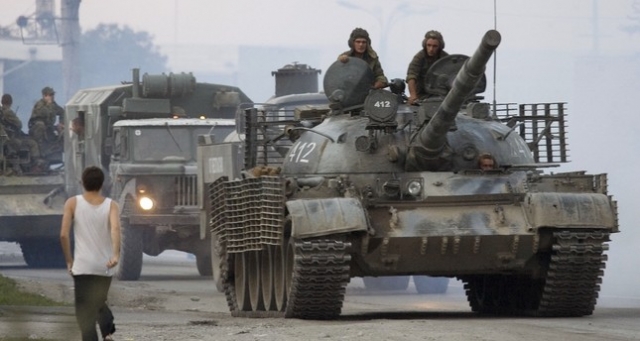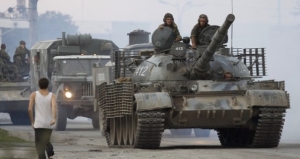11 Years Since Russia-Georgia War
This year marks the 11th anniversary of the Russia-Georgia war when the Russian Federation invaded the country and occupied two Georgian regions, Abkhazia and Tskhinvali, so-called South Ossetia.
August 7, 2008, is one of the most tragic dates in the modern history of Georgia. The war lasted for five days (7–12 August).
It has been eleven years since Russian tanks rolled through the Roki tunnel in an invasion that brought Russian forces 40 kilometers from Georgia’s capital. Today, 20% of Georgian territory remains invaded.
228 civilians, 170 military officers and 14 police officers lost their lives in the war, while 1747 people were wounded. Almost 150 thousand people were forced to leave their homes, 30,000 of which still remain as IDPs. Five soldiers also went missing.
Georgian-Russian relations were especially tense after the NATO Bucharest Summit. At the summit, which took place on April 1st, 2008, the leaders of the Alliance member states openly stated that Georgia would definitely become a NATO member.
The announcement angered Russia. Sergei Lavrov, the country's Minister of Foreign Affairs, said Moscow would do its best to prevent Georgia from joining NATO. President Vladimir Putin noted that Russia was ready to respond to NATO's position on "internal drafts".
On May 31 2008, Russia dispatched railroad troops to Abkhazia with the purpose of restoring the railway line there. It was completed a week before the August War broke out. Meanwhile, the situation in Tskhinvali region was getting more strained.
On July 30, the Ministry of Foreign Affairs of Russia released a special statement saying that the threat of an armed confrontation between Georgia and so-called South Ossetia was real.
The most serious clash between Ossetia’s armed forces and Georgians took place on 1 August, leaving 6 Ossetians dead and 7 injured. Meanwhile, Russia was moving "peacekeeping" units into the country.
Russia accused Georgia of "aggression against South Ossetia" and launched a large-scale land, air and sea invasion on Georgia on 8 August. Georgian armed forces became involved in a conflict with separatists and the Russian army. 15 thousand Russian military officers came from Roki tunnel and the Psou border. Russian military aviation carried out an air attack on military units and air bases in Georgian cities. Gori was bombed twice, including its military base. Russian jets bombed Vaziani base in Tbilisi, the airplane factory, the port of Poti, and military bases in Senaki and Marneuli.
The Russian army occupied Kodori Gorge on 12 August and the Akhalgori region on 16 August. Russian military officers occupied the village of Igoeti and locked down the road linking West and East parts of the country with armored vehicles.

Georgian soldiers, August 2008 War
Operations were ceased after mediation by the President of France, Nicolas Sarkozy, who brokered a 6-point ceasefire agreement on September 8.
According to the agreement, all Russian forces had to withdraw from the Tskhinvali and Abkhazia regions by October 10, 2008. Sarkozy and other leaders, President of Lithuania Valdas Adamkus, President of Poland Lech Kaczynski and President of Ukraine Viktor Yushchenko, visited Tbilisi. On 15 August, US Secretary of State Condoleezza Rice visited Georgia.
Russia recognized the independence of Abkhazia (Georgia’s breakaway region) and "South Ossetia" on 26 August 2008. On August 28, Russian President Dmitry Medvedev signed a decree recognizing South Ossetia and Abkhazia as independent states. In response, the Georgian government severed diplomatic relations with Russia. Russia only partially fulfilled its obligations defined by the 6-point ceasefire agreement, and its forces remained in the village of Perevi until October 18, 2010.
On October 23, 2008, the Georgian government passed the Law on Occupied Territories according to which the areas were given the status of occupied territories of Georgia by Russia.
Two Georgian regions, Abkhazia and Tskhinvali, remain occupied by Russia up to now and Russia continues discrimination and violence against ethnic Georgians, restrictions on the right of education in the native language, the right to property and even the right to life. Meanwhile, hundreds of thousands of internally displaced persons and refugees are still prevented from returning to their homes.
By Ana Dumbadze












